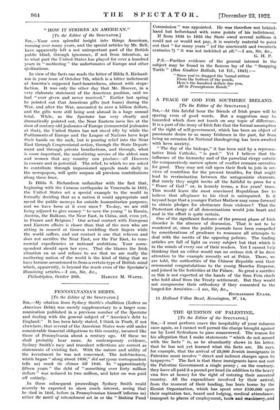A PEACE OF GOD FOR SOUTHERN IRELAND. [To the Editor
of the SPECTATOR.] SIR,—At this fateful hour the friends of Irish peace will be sparing even of good words. But a suggestion may be hazarded which does not touch on any topic of difference. It is a part of the irony of Irish fate that the formal assumption of the right of self-government, which has been an object of passionate desire to so many Irishmen in the past, far from being an occasion for National thanksgiving has been awaited with keen anxiety.
" The day of the bishops," it has been said by a represen- tative Irish Catholic, " is past." Yet I believe that the influence of the hierarchy and of the parochial clergy outside the comparatively narrow sphere of conflict remains operative for good. They may not call upon their flock to join in ser- vices of contrition for the present troubles, for that might lead to recrimination between the antagonistic elements. But surely they might invite all the faithful to press for a " Peace of God " or, in homely terms, a five years' truce. This would leave the most convinced Republican free to believe that allegiance to his ideal is unimpaired. Is it beyond hope that a younger Father Mathew may come forward to obtain pledges for abstinence from violence ? That the Protestant clergy of all denominations would join heart and soul in the effort is quite certain.
One of the significant features of the present phase of Irish disorder is the absence of discussion. That is not to be wondered at, since the public journals have been compelled by considerations of prudence to renounce all attempts to deal with the merits of the opposing policies. The leading articles are full of light on every subject but that which is in the minds of every one of their readers. Yet I cannot e!p thinking that an editor would run no serious risk if he drew attention to the example recently set at Pekin. There, we are told, the authorities of the Chinese Republic sent their ceremonial congratulations to the young Manchu Emperor, and joined in the festivities at the Palace. So great a sacrifice as this is not expected at the hands of the Sinn Fein chiefs who hold aloof from the Treaty settlement. But they would not compromise their orthodoxy if they consented to the longed-for Arrnistice.—I am, Sir, &c.,










































 Previous page
Previous page